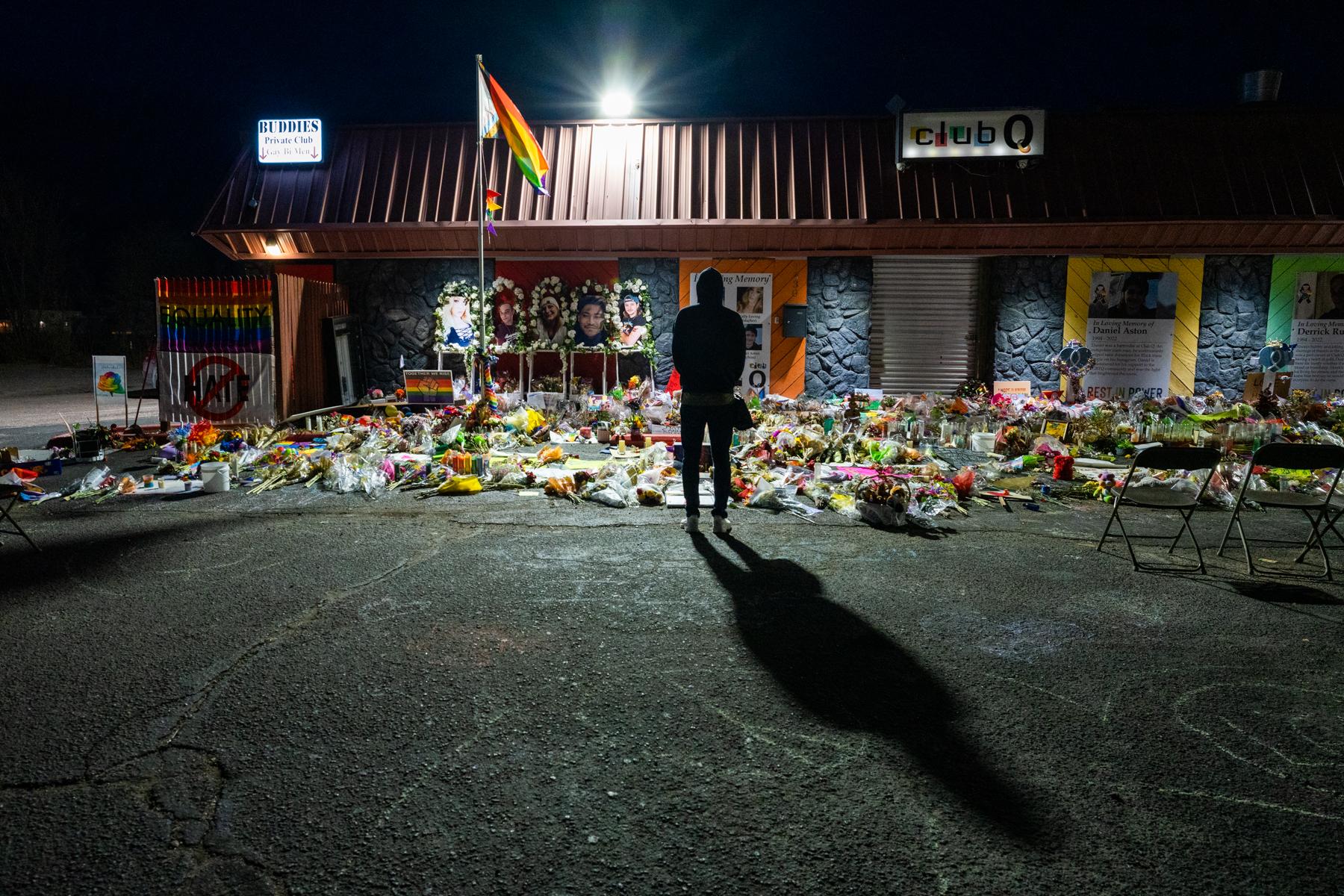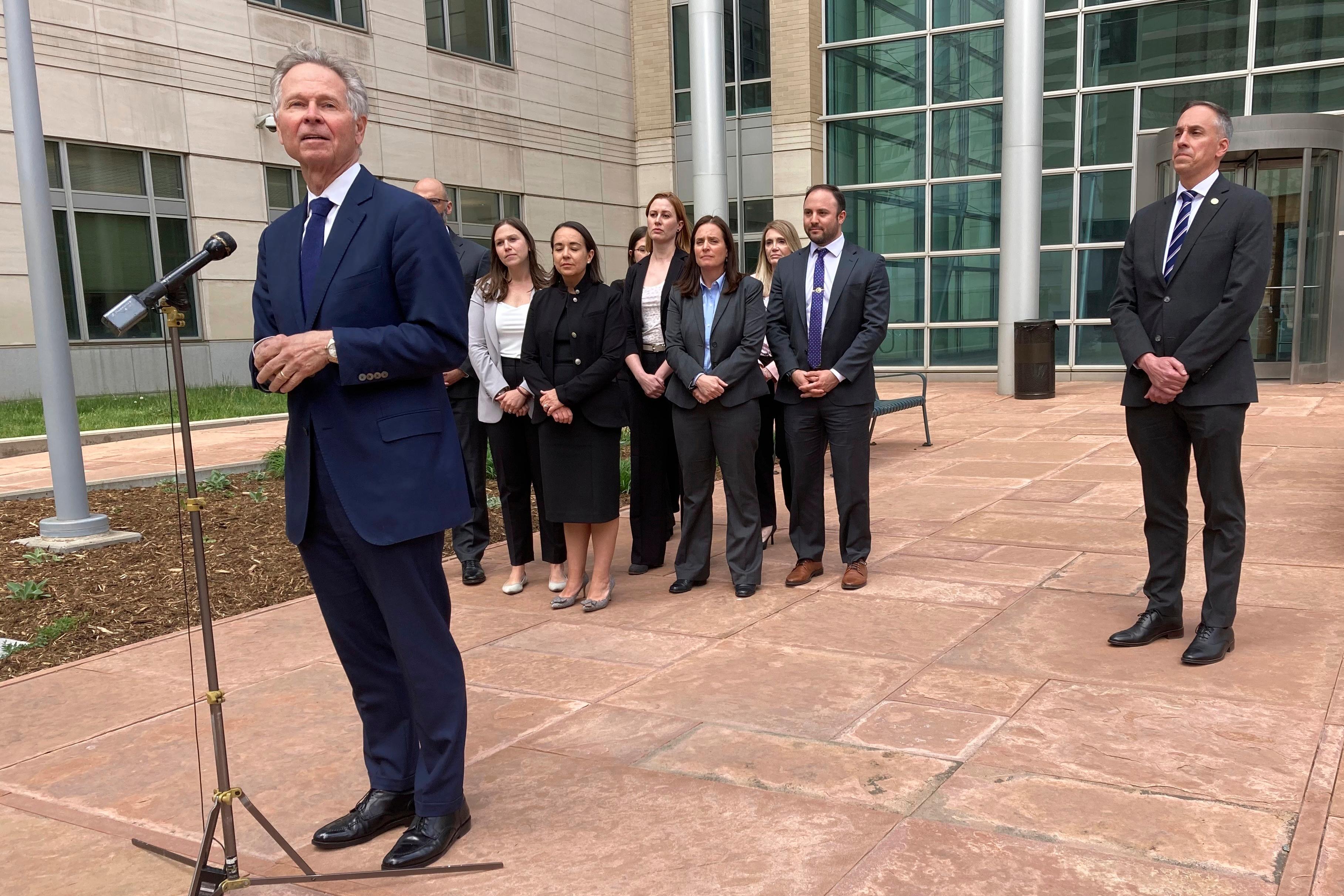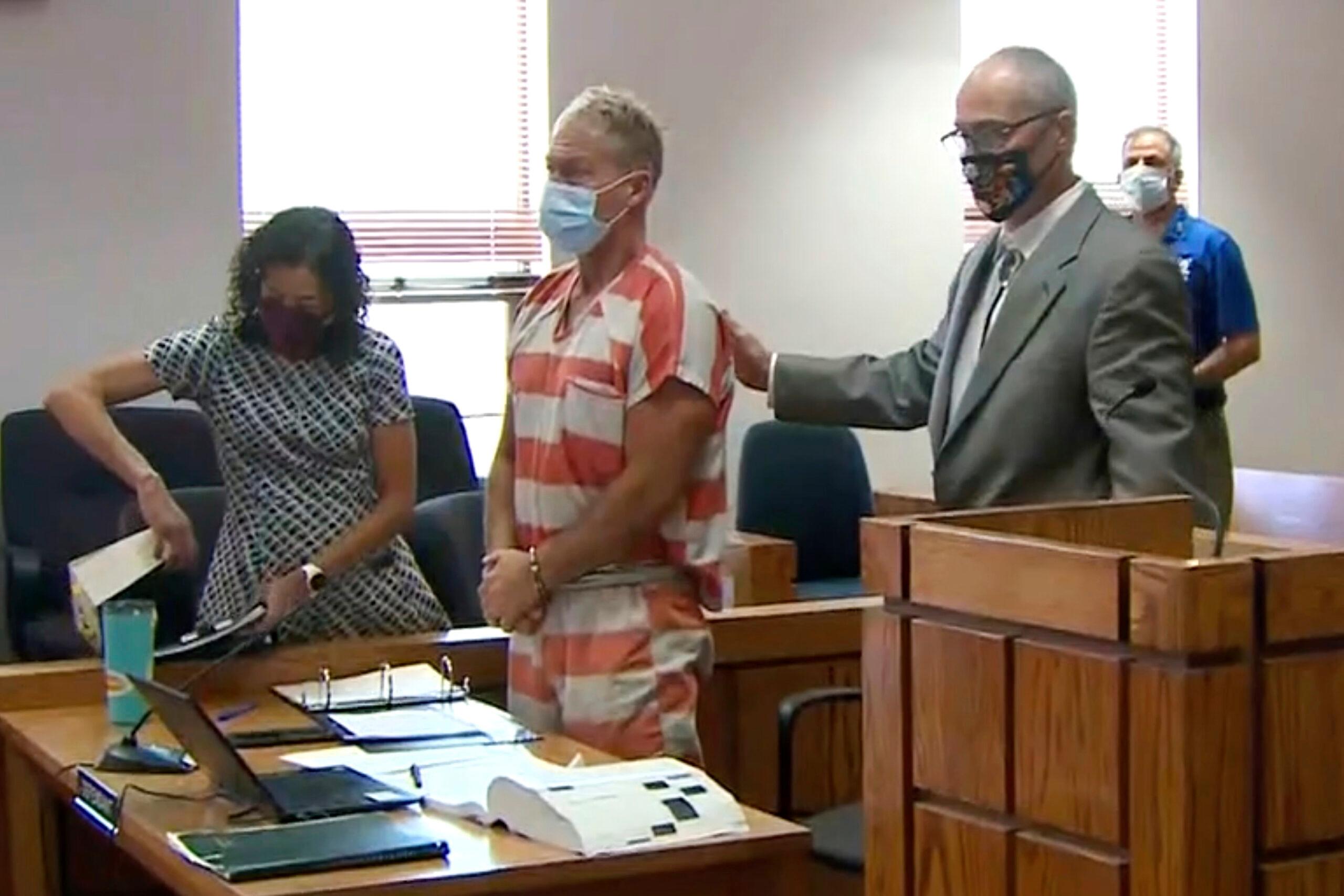
Standing before Judge Robin Chittum on July 5, the prosecution made a request: They needed more time to try the case against Anderson Lee Aldrich, a 22-year-old who faced five felonies after allegedly kidnapping family members and engaging in an armed standoff with a SWAT team in suburban Colorado Springs.
The stakes of the case appeared to be high. Two relatives had warned in a letter that Aldrich could “hurt or murder” if allowed to go free. The defendant had previously talked about becoming “the next mass shooter,” according to court records, and had repeatedly threatened their grandparents.
But a year had passed and the case was foundering.
The alleged kidnapping victims — Aldrich’s grandparents, Pamela and Jonathan Pullen — had moved to Florida and prosecutors were struggling to compel them to testify in the case. The grandmother had even filed a motion arguing that the prosecutors’ attempt to subpoena her was "improper."
“These witnesses have basically been avoiding everyone,” District Attorney Michael Allen recalled.
The case as it stood was “concerning,” Allen said. And it was doomed, with the deadline for the legal requirement of a “speedy trial” just a few weeks away. Instead of continuing the case, Chittum dismissed it, and Aldrich walked free.
“The court then dismissed, properly, that case because the witnesses were not cooperating with the prosecution,” Allen said.
Two days later, Aldrich’s attorney motioned “this Court to Seal his records” — a request that the judge granted under Colorado law, shielding the court records from public view.
Four months later, just before midnight on Nov. 19, Aldrich allegedly walked into Club Q and opened fire, killing five people and injuring 17 others.
The attack put the earlier criminal case at the center of public attention. On Thursday, Judge Chittum ordered the records unsealed, offering new details into the authorities' attempt to prosecute Aldrich; an alleged violent pattern of behavior that extended for years; and the suspect’s family’s role in shielding Aldrich from authorities.
Violence and threats
On June 18, 2021, Aldrich’s grandparents, Jonathan and Pamela Pullen, called a family meeting in their Colorado Springs home. They were planning a move to Florida, and they knew Aldrich didn’t want to go, according to court records.
As the grandparents waited at about 2 p.m., Aldrich emerged from the basement with an apparently homemade handgun and began to load ammunition, according to an account Pamela Pullen later gave to the authorities. They weren’t going anywhere, she recalled Aldrich saying.
“You guys die today, and I’m taking you with me,” Aldrich said, Pullen recalled in the report. “I’m loaded and ready. You’re not calling anyone.”
The hours to come would include the evacuation of 10 houses because of a bomb threat and an armed confrontation with a SWAT team.
It was a culmination of years of violent and threatening behavior by Aldrich described by family members in court records.
“Through the years we have watched as Anderson was brought up without limitations by his grandmother and given all that he wanted. At the same time there was no respect or boundaries as how he treated my brother Jonathan,” wrote Jonathan’s brother in a letter to the court.
In San Antonio, Texas, where Aldrich attended high school, the suspect attacked grandfather Pullen, who then lied to doctors about how it happened “due to being afraid of Anderson’s anger” if police intervened, the letter stated.
In 2019, the family’s move from San Antonio to a newly built home in Colorado Springs led Aldrich to again threaten the grandparents, according to Pullen’s brother.
He added that in Colorado, the pattern continued, with Aldrich punching holes in the wall and breaking windows and locks — while the suspect’s grandparents spent their nights in a locked bedroom with a bat by the head of the bed, according to the letter.
“My brother lived in a virtual prison,” he wrote. “Even the neighbors would not come near their home due to the shouting and atmosphere.”
At one point, Aldrich threatened to kill Jonathan and Pamela Pullen. That threat led a counselor to contact police, but Pamela Pullen “would not let [Aldrich] be taken” for a 72-hour hold, according to the letter.
Meanwhile, Pamela Pullen gave $30,000 to Aldrich, which the suspect spent on 3D printers, Jonathan’s brother wrote. Aldrich used those printers to make guns, according to Pullen, and authorities later seized a “ghost” handgun that lacked any identifying marks.
Aldrich appeared to talk openly about plans for those weapons, even before the June 21 confrontation. Pamela and Jonathan Pullen had been “living in fear” due to Aldrich’s “recent homicidal threats towards them and others,” according to a deputy’s report.
Aldrich had objected to the upcoming move to Florida because “it would interfere with [the suspect’s] plans to conduct a mass shooting and bombing,” Pamela Pullen later told authorities. And when the grandparents said on June 21 that they would be moving nonetheless, Aldrich reacted with violent threats.
A standoff with a SWAT team
After emerging from the basement of 9815 Rubicon Drive with a handgun, Aldrich took Pamela Pullen’s phone and threatened to kill the grandparents — unless they promised to stop the move, according to the deputy’s report.
Aldrich then showed Pamela Pullen a box with chemicals, saying it was a bomb “powerful enough to blow up a police department and a federal building,” the report continues. As the grandparents begged for their lives, Aldrich began “chugging vodka,” saying it was necessary for what would happen next, according to Pamela Pullen’s account.
When Aldrich returned to the basement, the grandparents ran to their car and called 911. Deputies responded and headed to Aldrich’s mother’s house, which was about a mile away on the 6300 block of Pilgrimage Road. They spotted the suspect’s gold Toyota Highlander.
Aldrich’s mother, Laura Voepel, was corresponding with her landlord via text message, saying that she “needed to make sure the cops weren’t coming for her son.” Meanwhile, she was “not cooperative” and avoided answering questions about her son’s location while on the phone with a sheriff’s deputy.
At about 4 p.m., two hours after the incident began, a SWAT team began encircling Voepel’s house. She then left the house, saying Aldrich had let her go. Deputies began evacuating several homes in the area, then sent an emergency text notification to those in a quarter-mile radius.
Aldrich, speaking to a sheriff’s office sergeant, ordered SWAT team members to “get back,” threatening to shoot through the walls and warning that there was a supply of the explosive material tannerite in the house.
Aldrich was “ready to go to the end,” with a gas mask and armor-piercing rounds, the suspect told a SWAT negotiator. But by 5:46 p.m. negotiators had convinced Aldrich to surrender, according to a press release from the sheriff’s office.
Aldrich “walked out the front door of the home and was apprehended.” Authorities confiscated the “ghost” handgun, a rifle and bomb-making materials, according to District Attorney Michael Allen.
A court case — but no witnesses
The suspect was charged with two counts of felony menacing and three counts of felony kidnapping. Early in the process, a judge verbally ordered Aldrich not to possess or buy any guns or firearms. The suspect would spend more than two months in jail on $1 million bond. The court then lowered that bond to $100,000 early in August.
District Attorney Allen said Aldrich’s family spoke favorably at an August 2021 bond hearing: “His mother at that hearing described him as loving and passionate. His grandmother described him as a sweet young man and that he did not deserve to be in jail. The grandfather described him as unusually bright and someone who will take advantage of a second chance.”
The suspect posted bond and left jail soon on Aug. 7, 2021. On Jan. 27, 2022, Aldrich pleaded not guilty to all charges. A trial was scheduled for May 31, but the prosecution asked for a delay.
By that point, the grandparents had moved to Florida, and prosecutors were struggling to compel them to testify, Allen said.
“We had not been able to effectively serve those victims with the process of service,” Allen said.
In June 2021, Pamela Pullen filed a motion meant to defeat the subpoena against her.
Her attorney argued that she had not been properly served and that Florida law, “does not allow for an out-of-state subpoena in a criminal matter.”
By June 23, the prosecution still had not managed to serve subpoenas to the grandmother and grandfather. On July 5, the prosecution requested another delay in the trial.
“These witnesses have basically been avoiding everyone,” Allen said.
But with the victims not forthcoming, Judge Robin Chittum refused to continue the case and dismissed the charges, according to Allen.
“If witnesses cannot be produced at a trial and we are against speedy trial, it is very common for a court to dismiss a case,” the DA said.
Club Q, and what's happened after
On July 7, Aldrich’s attorney moved to seal the records in the case. Just over a month later, the judge ordered the records sealed, marking the effective end of the case. The El Paso County Sheriff’s office refused to return the seized firearms when Aldrich asked for their return.
On Nov. 19, just before midnight, Aldrich allegedly entered Club Q, clad in body armor and heavily armed. The district attorney and the El Paso County Sheriff’s office have declined to answer questions about how the defendant acquired the guns. The sheriff said in a statement on Thursday that the weapons seized in the earlier case had been turned over to the district attorney.
Aldrich has been charged with 305 counts in the shooting, including murder and bias-motivated crimes.
During the first two hearings, Aldrich’s public defender has said Aldrich identifies as non-binary and uses they/them pronouns. In the motions four months ago, Aldrich’s attorney used he/him pronouns and family members also used he/him pronouns in their statements.
Allen, the district attorney, said that it’s “common” for family members to not testify against a loved one, but that he wasn’t sure why it had happened in the Aldrich case.
“I can't tell you. I can only tell you that they didn't cooperate and it led to the dismissal of that case. But this office absolutely prosecuted it. We prosecuted it until we couldn't prosecute it any longer and it would not have prevented the Club Q shooting,” he said.
In the wake of the shooting, politicians and advocates have called for more reforms to Colorado’s gun laws — and they’ve asked, once again, how to stop mass violence.









